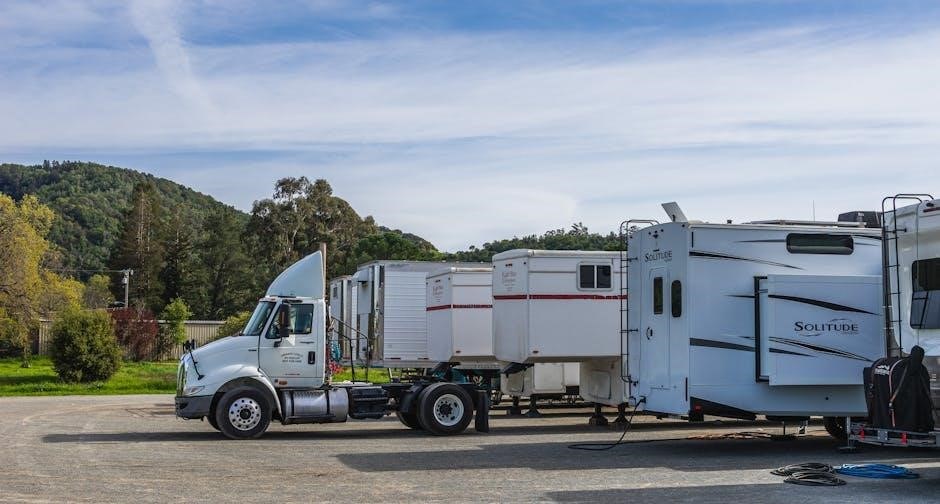A truck rental agreement is a legally binding contract between the truck owner and renter‚ outlining the terms and responsibilities for renting a vehicle․ It ensures clarity on usage‚ payment‚ and liability‚ providing a smooth rental experience for both parties․
1․1 Definition and Purpose
A truck rental agreement is a legally binding contract between the truck owner (lessor) and the renter (lessee)‚ detailing the terms for renting a vehicle․ Its primary purpose is to establish clear responsibilities‚ payment terms‚ and usage guidelines‚ ensuring both parties understand their obligations․ This document protects the interests of both the lessor and lessee by outlining the rental duration‚ vehicle condition‚ and liability clauses‚ fostering a transparent and mutually beneficial arrangement․ It serves as a formal record of the rental transaction‚ preventing disputes and ensuring compliance with legal standards․
1․2 Importance of a Written Agreement
A written truck rental agreement is essential for establishing clear terms and protecting both parties․ It ensures the renter understands their responsibilities‚ payment terms‚ and usage restrictions‚ reducing the risk of disputes․ The agreement serves as a legally binding document‚ providing a record of the rental terms and conditions; Without it‚ misunderstandings or legal conflicts may arise‚ as verbal agreements are difficult to enforce․ A written contract ensures transparency‚ accountability‚ and compliance with legal standards‚ making it a critical component of the rental process for both the lessor and lessee․

Key Components of a Truck Rental Agreement
A truck rental agreement includes essential details like parties involved‚ rental duration‚ payment terms‚ vehicle condition‚ and insurance․ These components ensure a clear‚ legally binding arrangement for both parties․
2․1 Parties Involved
A truck rental agreement clearly identifies the lessor (truck owner) and the lessee (renter)․ The lessor is the legal entity or individual owning the vehicle‚ while the lessee is the party renting it for a specified period․ Both parties must be named in the agreement with their contact information to ensure accountability․ This section establishes the roles and responsibilities of each party‚ preventing disputes and ensuring clarity in the transaction․ The lessee may be a business or an individual‚ and their details must be accurately recorded for legal validity and smooth communication throughout the rental period․
2․2 Rental Duration and Terms
The truck rental agreement specifies the rental period‚ including start and end dates‚ and the agreed duration (daily‚ weekly‚ or monthly)․ It outlines the terms for rental extensions‚ early returns‚ and late fees․ The document may include clauses for automatic renewal if the lessee continues using the truck beyond the initial term․ Terms also cover the return conditions‚ such as required notice periods and penalties for late returns․ This section ensures both parties understand the timeframe and any flexibility or restrictions regarding the rental duration‚ preventing misunderstandings and ensuring compliance with the agreed terms․
2․3 Payment Terms and Conditions
The payment terms outline the rental charges‚ including the base rate‚ mileage fees‚ and additional costs for services like insurance or equipment․ It specifies the payment methods accepted‚ such as credit cards or bank transfers‚ and the due dates for payments․ Late payments may incur penalties or late fees‚ as detailed in the agreement․ The document also clarifies whether a security deposit is required and how it will be refunded․ This section ensures transparency in financial obligations‚ protecting both the lessor and lessee by clearly defining the payment structure and consequences of non-compliance․
2․4 Vehicle Description and Condition
The agreement provides a detailed description of the rented truck‚ including its make‚ model‚ year‚ and Vehicle Identification Number (VIN)․ It outlines the vehicle’s condition at the time of rental‚ noting any existing damage or wear․ The section also specifies the mileage and the responsibility of the renter to return the truck in the same condition‚ barring normal wear and tear․ Accurate documentation of the vehicle’s state helps prevent disputes and ensures both parties are aligned on its condition before and after the rental period․
2․5 Insurance and Liability Clauses
The truck rental agreement specifies the insurance requirements and liability terms․ It outlines the types of coverage‚ such as collision or liability insurance‚ and who is responsible in case of damage or accidents; The agreement may require the renter to provide proof of insurance or purchase coverage from the rental company․ Liability clauses define the extent of financial responsibility for damages or injuries‚ ensuring both parties understand their obligations․ This section is crucial for protecting both the renter and the truck owner from unforeseen incidents during the rental period․

Legal Considerations
A truck rental agreement must comply with state and federal regulations‚ ensuring legal obligations are met․ It protects both parties’ rights and interests‚ minimizing disputes․
3․1 Contractual Obligations
A truck rental agreement establishes clear contractual obligations for both the lessor and lessee․ It outlines the terms of payment‚ vehicle usage‚ and duration of the rental․ The agreement ensures both parties understand their responsibilities‚ such as maintenance‚ insurance‚ and return conditions․ Breach of these obligations can lead to legal consequences․ The contract must be legally binding‚ protecting the rights of both parties and ensuring compliance with relevant laws․ Proper documentation is essential to avoid disputes and maintain a professional relationship․ The agreement serves as a reference point for resolving any issues that may arise during the rental period․
3․2 State and Federal Regulations
Truck rental agreements must comply with both state and federal regulations to ensure legal compliance․ These regulations cover safety standards‚ licensing requirements‚ and insurance mandates․ Federal laws‚ such as those set by the Federal Motor Carrier Safety Administration (FMCSA)‚ govern commercial vehicle operations․ State-specific rules may include licensing‚ permits‚ and environmental regulations․ The agreement must adhere to these laws to avoid penalties and ensure the rental process is legally sound․ Compliance with these regulations protects both parties and maintains public safety․ Understanding and incorporating these rules is essential for a valid and enforceable truck rental agreement․
3․3 Dispute Resolution Processes
Truck rental agreements often include dispute resolution processes to address potential conflicts․ These processes may involve mediation‚ arbitration‚ or legal action․ Mediation is a common first step‚ where a neutral third party facilitates negotiations between the renter and the rental company; Arbitration may be used if mediation fails‚ with a binding decision made by an arbitrator․ Legal action is typically the last resort․ The agreement should outline the preferred resolution method and jurisdiction for legal disputes․ Clear dispute resolution clauses help ensure conflicts are resolved efficiently and fairly‚ minimizing delays and costs for both parties․

Benefits of Using a Truck Rental Agreement
A truck rental agreement provides legal protection‚ clarity in responsibilities‚ and enforceability of terms‚ ensuring both parties understand their obligations and rights‚ minimizing potential disputes․
4․1 Protection for Both Parties
A truck rental agreement ensures legal protection for both the lessor and lessee by clearly outlining rights‚ responsibilities‚ and liability clauses․ It safeguards the lessor from unauthorized use or damage beyond normal wear and tear‚ while protecting the lessee from unfair charges․ The agreement also specifies insurance coverage‚ ensuring financial protection in case of accidents or theft․ By formalizing the terms‚ it minimizes disputes and provides a clear framework for resolving issues‚ offering peace of mind and security for both parties involved in the rental process․
4․2 Clarity in Responsibilities
A truck rental agreement provides clear definitions of the roles and responsibilities of both the lessor and lessee․ It outlines the lessee’s duty to maintain the vehicle properly and return it in good condition‚ while the lessor is responsible for ensuring the truck is roadworthy at the start of the rental․ This clarity prevents misunderstandings and ensures both parties understand their obligations‚ fostering a transparent and fair rental process․ By detailing expectations upfront‚ it helps avoid disputes and promotes accountability from both sides throughout the agreement term․
4․4 Enforcement of Terms
A truck rental agreement ensures that all agreed-upon terms are legally enforceable․ By clearly outlining the rights and obligations of both parties‚ it provides a framework for resolving disputes and addressing breaches of contract․ The agreement is legally binding‚ allowing either party to seek remedies if terms are violated․ This ensures accountability and maintains the integrity of the rental arrangement․ Proper documentation and signatures formalize the commitments‚ protecting both the renter and the owner from potential disputes or misunderstandings․ Enforcement of terms guarantees a structured and fair rental process for all involved․
How to Create a Truck Rental Agreement
To create a truck rental agreement‚ begin by identifying the parties involved and outlining the rental duration and terms․ Include the vehicle description‚ condition‚ and insurance liability․ Specify payment terms‚ return policy‚ and communication methods․ Use a PDF template from a reliable source like pdfFiller‚ ensuring legal compliance and customization to meet specific needs․ Finally‚ have the agreement reviewed by a legal professional before finalizing it․
5․1 Choosing the Right Template
Selecting the right template for a truck rental agreement is crucial to ensure compliance with legal standards and clarity․ Use a PDF template from reputable platforms like pdfFiller‚ which offers customizable and legally binding forms․ Ensure the template includes essential components such as rental duration‚ payment terms‚ and vehicle description․ Avoid generic templates that lack specific details relevant to truck rentals․ Always verify that the template complies with state and federal regulations․ A well-structured template will save time and reduce the risk of disputes‚ providing a professional foundation for your agreement․
5․2 Customizing the Agreement
Customizing a truck rental agreement ensures it meets specific needs․ Start with a template from platforms like pdfFiller‚ then tailor sections such as rental duration‚ payment terms‚ and vehicle condition․ Clearly outline responsibilities‚ insurance requirements‚ and return policies․ Include clauses for late fees‚ damages‚ and mileage limits if applicable․ Ensure all terms comply with local laws and reflect the unique details of the rental․ Consulting a legal professional can help avoid omissions and ensure enforceability․ A well-customized agreement reduces misunderstandings and protects both parties‚ fostering a smooth rental process․
5․3 Review and Sign-Off
Once the agreement is customized‚ both parties must review it thoroughly to ensure all terms are clear and agreed upon․ Use digital tools like pdfFiller to facilitate easy signing online․ The renter and owner should sign and date the document‚ with copies distributed to both parties․ This step ensures mutual understanding and accountability‚ preventing future disputes․ A signed agreement is legally binding and serves as proof of the agreed terms․ Ensure all details are accurate before finalizing‚ as this document will govern the rental process and protect both parties’ interests․

Best Practices for Truck Rentals
Conduct a thorough vehicle inspection‚ review the rental terms‚ and ensure clear communication with the rental company to avoid misunderstandings and ensure a smooth experience․
6․1 Inspecting the Vehicle
Thoroughly inspect the truck before renting to identify any existing damage or issues․ Check the exterior‚ interior‚ tires‚ and mechanical components․ Compare your findings with the rental company’s condition report․ Test all functionalities‚ such as brakes‚ lights‚ and mirrors‚ to ensure everything works properly․ Document any damage or malfunctions with photos or notes․ This step protects both parties by providing a clear record of the vehicle’s condition at the start of the rental period․ A detailed inspection helps prevent disputes and ensures a fair agreement․ Always review and agree on the condition report with the rental provider before signing․
6․2 Understanding the Return Policy
Understand the return policy to avoid additional charges or disputes․ Ensure the agreed-upon return date‚ time‚ and location are clearly stated in the agreement․ Check if there are penalties for late returns or early drop-offs․ Review the inspection process upon return to verify the truck’s condition․ Be aware of any requirements for fuel levels or cleanliness․ Knowing the return policy helps you avoid unexpected fees and ensures compliance with the terms․ Always confirm the return details with the rental provider to maintain a smooth and hassle-free experience․ A clear return policy protects both parties and ensures accountability․
6․3 Communicating with the Renter
Effective communication is crucial to ensure a smooth rental experience․ Clearly discuss the terms‚ conditions‚ and expectations before finalizing the agreement․ Be available to address any questions or concerns the renter may have․ Confirm the return details and ensure both parties understand their responsibilities․ Regular updates and transparent dialogue can prevent misunderstandings․ Use digital tools like PDF templates to share and sign agreements effortlessly‚ ensuring clarity and accountability for both parties involved in the truck rental process․ Clear communication fosters trust and ensures a hassle-free transaction․
A truck rental agreement is an essential document that protects both the renter and the rental company by outlining clear terms and responsibilities․ It ensures transparency in payment‚ vehicle condition‚ and liability․ By using a detailed agreement‚ both parties can avoid disputes and ensure a smooth rental experience․ Investing time in creating or customizing a professional truck rental agreement template‚ such as those available in PDF format‚ guarantees a secure and mutually beneficial arrangement․ This formal contract is vital for maintaining trust and accountability throughout the rental period․




